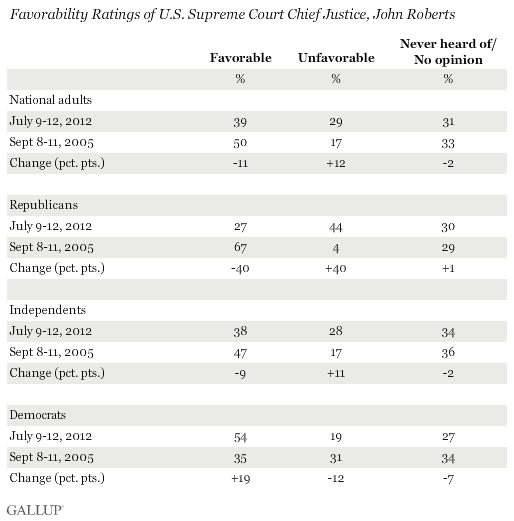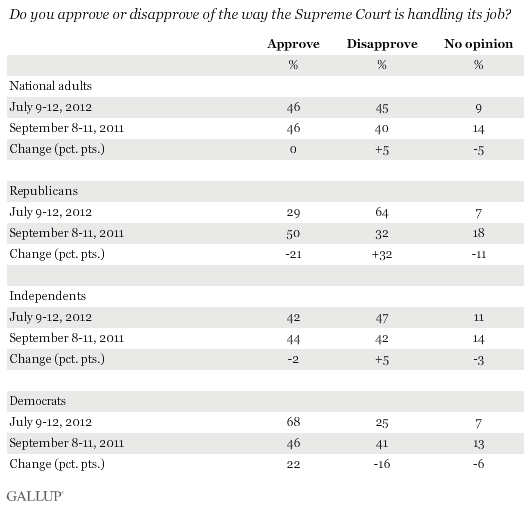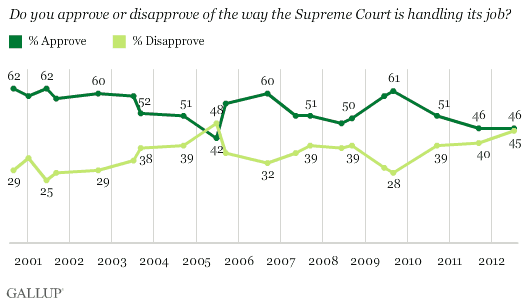PRINCETON, NJ -- Americans' opinions of U.S. Supreme Court Chief Justice John Roberts are now much more negative than they were seven years ago, with the most recent reading coming soon after he joined the four Democratic appointees on the court to uphold the U.S. healthcare law. Republicans' favorable rating of Roberts is down 40 percentage points from 2005, while Democrats' is up 19.

Gallup did not measure Americans' opinions of Roberts between September 2005 and the most recent survey, conducted July 9-12. It is a reasonable assumption, however, that a good deal of the shift in attitudes occurred as a result of the June 28 Supreme Court decision upholding the constitutionality of the Patient Protection and Affordable Care Act of 2010, a ruling whose majority opinion was written by Roberts.
Roberts, considered to be a conservative jurist, was nominated in 2005 by Republican President George W. Bush, first as an associate justice, and then, after the death of William Rehnquist, as chief justice. He was confirmed by the Senate and took the constitutional oath on Sept. 29, 2005. Republicans were more positive about Roberts at that point than either Democrats or independents. Americans overall broke 50% favorable to 17% unfavorable in 2005, with one-third saying they had no opinion.
Now, in the aftermath of the decision that upheld Democratic President Barack Obama's signature first-term legislative accomplishment, Republicans' views are the least positive among the three partisan groups, their attitudes about Roberts having shifted dramatically from a +63 net positive to a -17 net negative. Democrats' opinions shifted over the same period from a +4 to a +35, while those of independents mirrored the national pattern, moving from a +30 to a +10. Americans overall are still more positive than negative about Roberts, 39% to 29%, but this +10 margin is significantly smaller than the +33 in 2005.
Republicans' Opinions of Supreme Court Also Plummets
Mirroring their shift in views of Chief Justice Roberts, Republicans have become much more negative about the Supreme Court since last September. Democrats have become more positive. Twenty-nine percent of Republicans now approve of the court's job performance, down from 50%, while disapproval has doubled to 64% from 32%. Democrats' attitudes flipped in the opposite direction, with approval rising to 68% from 46%. Independents' attitudes have stayed roughly the same, as have the views of all Americans combined.

The current 46% who approve of the job the Supreme Court is doing is, along with last year's reading, one of the lowest measured over the last 11 years.

Implications
The recent U.S. Supreme Court ruling on the Affordable Care Act, anchored by Chief Justice John Roberts' majority opinion, has apparently caused a major shift in Republicans' and Democrats' views of both the court and Roberts. Whereas Republicans were initially highly favorable toward Roberts in 2005, when he was considered a conservative justice appointed by a conservative Republican president, their opinions are now more negative than positive. Democrats, initially evenly split in their views of Roberts, now appear to be big fans, with a +35 net favorable over unfavorable rating.
Opinions about the U.S. Supreme Court more broadly have shifted in similar fashion. Republicans and Democrats had roughly similar favorable opinions of the court last September. Now, about two-thirds of Republicans have an unfavorable opinion, while about the same percentage of Democrats have a favorable opinion.
These views may mellow over time as the immediacy of the June 28 decision on the healthcare law fades. Plus, next year's Supreme Court docket promises new decisions on a list of other potentially highly controversial issues. At the moment, however, both the court and Chief Justice Roberts have fallen out of favor with the GOP, while Democrats view them in a favorable light.
Survey Methods
Results for this Gallup poll are based on telephone interviews conducted July 9-12, 2012, with a random sample of 1,014 adults, aged 18 and older, living in all 50 U.S. states and the District of Columbia.
For results based on the total sample of national adults, one can say with 95% confidence that the maximum margin of sampling error is ±4 percentage points.
Interviews are conducted with respondents on landline telephones and cellular phones, with interviews conducted in Spanish for respondents who are primarily Spanish-speaking. Each sample includes a minimum quota of 400 cell phone respondents and 600 landline respondents per 1,000 national adults, with additional minimum quotas among landline respondents by region. Landline telephone numbers are chosen at random among listed telephone numbers. Cell phone numbers are selected using random-digit-dial methods. Landline respondents are chosen at random within each household on the basis of which member had the most recent birthday.
Samples are weighted by gender, age, race, Hispanic ethnicity, education, region, adults in the household, and phone status (cell phone only/landline only/both, cell phone mostly, and having an unlisted landline number). Demographic weighting targets are based on the March 2011 Current Population Survey figures for the aged 18 and older non-institutionalized population living in U.S. telephone households. All reported margins of sampling error include the computed design effects for weighting and sample design.
In addition to sampling error, question wording and practical difficulties in conducting surveys can introduce error or bias into the findings of public opinion polls.
View methodology, full question results, and trend data.
For more details on Gallup's polling methodology, visit www.gallup.com.
